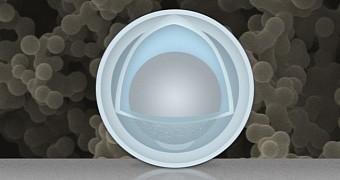During a recharging cycle, batteries shrink and then double in size when they discharge and recharge, an effect that can severely affect their "skin" and can also consume lithium irreversibly, leading to the known battery degradation over time.
To improve this issue, researchers from MIT and Tsinghua University in China decided to insert inside batteries an electrode made of nanoparticles with a solid shell and with an "egglike yolk" inside that will change size every time the battery is charged and discharged, without affecting the outer shell. This way, the scientists say, the battery life will be drastically improved, with a considerable boost to the battery's capacity and power.
To improve this research even further, aluminum is used for the lithium-ion battery's negative electrode. Apparently, using nanoparticles with an aluminum expandable yolk inside a titanium dioxide shell is an excellent combination for high-capacity anodes.
Until now, lithium-ion rechargeable batteries have used anodes made from graphite, which store energy of about 0.35 ampere-hours per gram (Ah/g), and while much better energy storing materials have been found, like Lithium metal, the latter can catch fire and short-circuit often, while silicon and tin-based energy storing materials discharge and recharge at unacceptably high rates.
Another reason aluminum and titanium oxide shells were chosen is that they are inexpensive and the manufacturing method is simple and could be scaled easily for any battery size.

 14 DAY TRIAL //
14 DAY TRIAL //